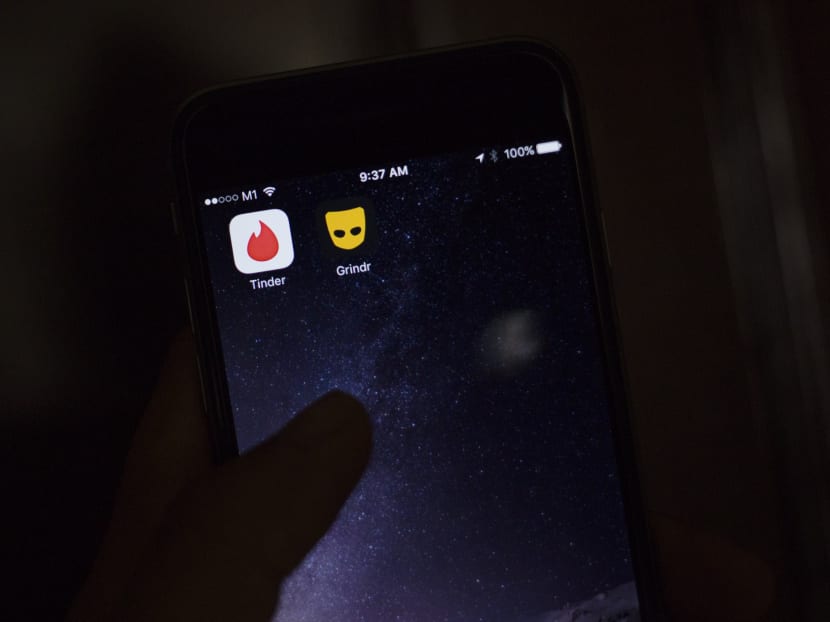Drug users turning to apps to get their fix
SINGAPORE — It used to be the case that a drug abuser needed to know a dealer personally, or had to risk getting caught red-handed by turning up at shady spots, in order to score a hit.

Dating apps Tinder and Grindr are shown on an Apple iPhone in this photo illustration taken on May 7, 2017. TODAY photo
SINGAPORE — It used to be the case that a drug abuser needed to know a dealer personally, or had to risk getting caught red-handed by turning up at shady spots, in order to score a hit.
Now, getting their fix has become less onerous, with some exploiting social networking and messaging platforms, such as Tinder, Grindr or Telegram.
Dealers have found a new conduit to send junkies their orders. Private hire drivers, who are out and about all day, can swiftly make deliveries under good cover, although the new vocational licensing regime, which includes “background checks” by the Land Transport Authority, could mean this gig would soon be up.
The buying of drugs online was recently flagged as a worrying trend by the Central Narcotics Bureau last year: 201 people were arrested for buying drugs and drug-related paraphernalia online, a nearly seven-fold jump from the 30 nabbed in 2015.
Most of these buyers, who receive their purchases through mail parcels, were between 20 and 39 years old.
Checks by TODAY showed that on dating apps such as Tinder and Grindr, users can easily solicit drugs by embedding code words in their profile name or description. Terms of everyday items or common verbs, or even emoticons and acronyms, are used to signal what type of drug an abuser is looking for, and before long, hosts of drug parties would come calling.
Charles (not his real name), 25, is one former user. From 2013 to 2015, he joined such drug parties every weekend, until his parents found out.
“You’ll be amazed at how many people are looking for it,” he said. “It made it so much easier for kids as young as 18-year-old national servicemen to get on drugs.”
Each time he indicated his interest in drugs on Grindr, at least 10 people would initiate chats, touting “chemsex”, referring to people having sex while high on Ice.
Those invited would usually get an address with just a block number, and someone would pick them up when they arrive. “It’s always a bit scary. You never know if they are undercover police,” Charles said.
In these parties, which can stretch from Friday to Sunday night, as many as six party-goers would get high together, engage in marathon sex, and not sleep.
During the day, curtains would be drawn to keep the room dark, while the illicit activities continued.
The hosts, typically older working adults holding successful jobs, would sponsor the drugs.
The court recently heard the case of a man who used Grindr to get to these drug parties. He pleaded guilty to drug consumption and is waiting to be sentenced.
Lawyer Kalidass Murugaiyan told TODAY: “Generally, anonymity of social (networking) apps give a lot of room for users to operate under a cover ... The inter-linking of social media to do this sort of activity (such as hosting a drug party) makes it harder to detect.”
Other drug abusers have also adapted their purchase process to evade detection. Instead of making a call or sending an SMS to a dealer, some have turned to messaging platforms such as Telegram for its “secret chat” function, which allows users to preset a time for messages to self-destruct.
Sometimes, private hire drivers are the runners, said former drug abuser Matthew Poh, 46, who served a one-year sentence for drug consumption. He had briefly dealt drugs with a group of four other friends, all of whom were later rounded up by the police. They are now serving their sentences: Two of them for 17 years, one for 12 years and one receiving the death penalty.
“(The drivers’) job requires them to move from one place to another. There is no better complementing job out there (for drug deliveries),” Poh said, adding that making two or three deliveries could net these drivers an extra S$1,000 a week.
When contacted, Uber said it “absolutely” does not condone such illegal activities. “This would be considered a clear violation of Uber’s community guidelines and is grounds for account deactivation. At any time, we also stand ready to cooperate with law enforcement authorities with their investigation,” a spokesperson added.
Meanwhile, ride-hailing app Grab told TODAY illegal substances “are not permitted” in drivers’ vehicles.
“This is against the law and (is) a serious violation of Grab’s code of conduct for driver-partner which will result in termination of access to the Grab platform,” its spokesperson said.








